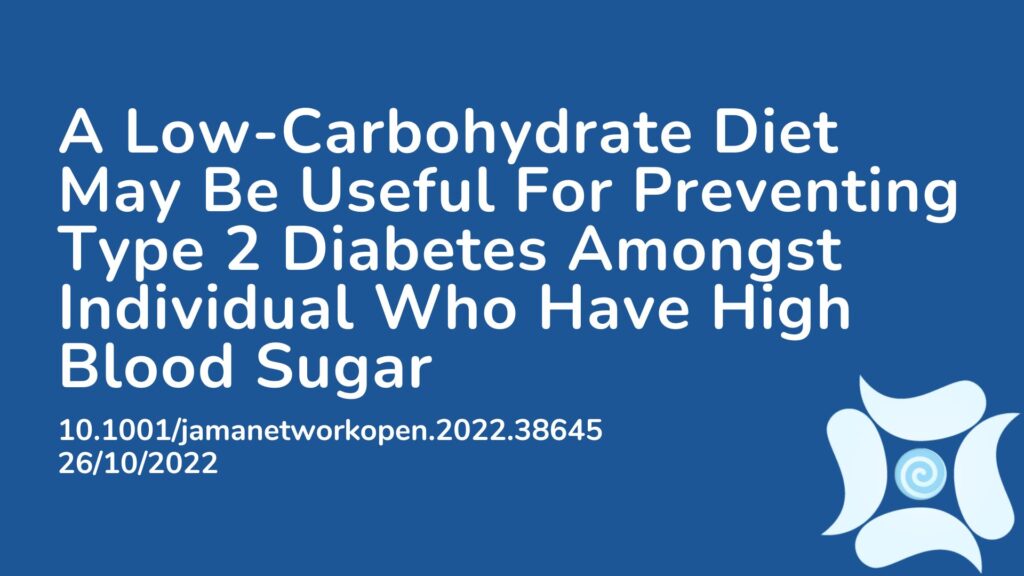Summary:
This clinical trial looks at how a low-carbohydrate diet impacts participants with high blood sugar levels, which is a risk factor for type 2 diabetes and other cardiometabolic diseases. This is an important piece of research as most literature focuses on the implementation of a low-carbohydrate diet once already being diagnosed with type 2 diabetes and taking medication, as opposed to using a low-carbohydrate diet as a preventative measure to decrease blood sugar levels and prevent the need for medication. The 150 participants included in this study were allocated to either a low-carbohydrate diet (less than 40 grams during the first 3 months and less than 60 grams for months 3 to 6) or a usual diet with higher carbohydrate intake. Compared with the usual diet group, the low-carbohydrate group showed significantly greater reductions at 6 months in blood sugar levels including fasting glucose and body weight. The authors concluded that this dietary intervention might be a useful approach for preventing and treating type 2 diabetes, but that much more research is needed to understand the longer term impacts of sustaining this diet.
Abstract:
Importance: Low-carbohydrate diets decrease hemoglobin A1c (HbA1c) among patients with type 2 diabetes at least as much as low-fat diets. However, evidence on the effects of low-carbohydrate diets on HbA1c among individuals with HbA1c in the range of prediabetes to diabetes not treated by diabetes medications is limited. Objective: To study the effect of a behavioral intervention promoting a low-carbohydrate diet compared with usual diet on 6-month changes in HbA1c among individuals with elevated untreated HbA1c. Design, Setting, and Participants: This 6-month randomized clinical trial with 2 parallel groups was conducted from September 2018 to June 2021 at an academic medical center in New Orleans, Louisiana. Laboratory analysts were blinded to assignment. Participants were aged 40 to 70 years with untreated HbA1c of 6.0% to 6.9% (42-52 mmol/mol). Data analysis was performed from November 2021 to September 2022. Interventions: Participants were randomized to a low-carbohydrate diet intervention (target <40 net grams of carbohydrates during the first 3 months; <60 net grams for months 3 to 6) or usual diet. The low-carbohydrate diet group received dietary counseling. Main Outcomes and Measures: Six-month change in HbA1c was the primary outcome. Outcomes were measured at 0, 3, and 6 months. Results: Of 2722 prescreened participants, 962 underwent screening, and 150 were enrolled (mean [SD] age, 58.9 [7.9] years; 108 women [72%]; 88 Black participants [59%]) and randomized to either the low-carbohydrate diet intervention (75 participants) or usual diet (75 participants) group. Six-month data were collected on 142 participants (95%). Mean (SD) HbA1c was 6.16% (0.30%) at baseline. Compared with the usual diet group, the low-carbohydrate diet intervention group had significantly greater 6-month reductions in HbA1c (net difference, –0.23%; 95% CI, –0.32% to –0.14%; P < .001), fasting plasma glucose (–10.3 mg/dL; 95% CI, –15.6 to –4.9 mg/dL; P < .001), and body weight (–5.9 kg; 95% CI, –7.4 to –4.4 kg; P < .001). Conclusions and Relevance: In this randomized clinical trial, a low-carbohydrate dietary intervention led to improvements in glycemia in individuals with elevated HbA1c not taking glucose-lowering medication, but the study was unable to evaluate its effects independently of weight loss. This diet, if sustained, might be a useful dietary approach for preventing and treating type 2 diabetes, but more research is needed.
Article Publication Date: 26/10/2022
DOI: 10.1001/jamanetworkopen.2022.38645



